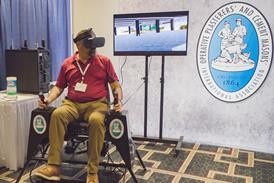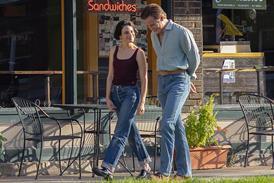Dir:Angela Schanelec. Germany. 2004. 95mins
AngelaSchanelec's Marseille starts badly and gets worse. Festival-goers - thefilm played in Un Certain Regard at Cannes - are all too familiar with the kindof movie in which someone unnamed wanders aimlessly and interminably, withoutbenefit of characterisation or plot, around a city. The sad thing about Marseilleis that this part of the film is by far the best.
(Itshould be understood that the plot summary that follows is a reconstructionbarely achieved by the end of the film, and only with the aid of the pressmaterial.)
Marseille opens with a young womanexchanging apartment keys with another young woman. They are speaking inFrench, but we gradually discover that one, who we learn still later is namedSophie (Eggert), is German. We know that the city is Marseille when it isrevealed in one of the three conversations contained in the first half of thefilm.
Despitethe ongoing struggle to figure out who's who and what their problems are, thefirst 30 minutes are very subtly accomplished. Virtually all the French peoplethat Sophie encounters are off screen or out of focus, which is an effectivetechnique for suggesting her loneliness and isolation.
Seekingto hire a car, she meets a car repairman (Loret) in a nearby shop, and thenagain later in a cafe, where all those nice character details (names, place,professions) come out, well into the film. Most of the cafe scene is done inone quite riveting stationary shot, and the awkward silences in the talk of twoyoung people, occasioned by the possibility of sex, is captured quite well.Sophie tells Pierre that "I never know when to stop" but such enthusiasm rarelyworks its way into the actual film.
Suddenlywe are transported to an unnamed town in Germany. We encounter a mother and achild, whom we learn later are named Hanna (Sellem) and Anton (Schanelec). Butfor an unconscionably long time we haven't the slightest idea who they are,until it is revealed that Hanna is Sophie's friend.
Hannanext talks to an unidentified man about interesting things such as phantompain, Chekhov and desire, but alas this all comes in one or two sentences andis not followed up. Next we move to a washing machine factory, where picturesare being taken of the female workers by a photographer we do not see ' againfor an interminable time ' until we find out that it is Ivan (Striesow), theman that Hanna had been talking to earlier.
Afterthat we move to the rehearsal of a play (title unspecified) where we get to seea scene done three times. It is only at the end of this rehearsal scene that wefigure out that Hanna is playing the maid, though sharp-eyed viewers may pickup on this earlier. A scene in a swimming pool follows in which Hannacastigates Sophie for not having to actually be responsible for either Ivan orAnton and much is clarified (sort of).
Accordingto the press materials, Sophie feels an unspoken love for Ivan, and watchingthe film demonstrates that it is definitely unspoken and, really, not evenhinted at. She decides to go back to Marseille. We see her in the train, thenin a policeman's office where she is recounting some completely unfathomablecrime, weirdly, in German through a translator. She cries. She walks to whatappears to be the German consulate. The film ends with an extreme long shot ofwhat we guess is Sophie walking on the beach in the failing light.
Thereis no doubt that director Schanelec is possessed of a fine eye, but audiencesalso need some tiny modicum of a coherent story, even if it is toldsuper-elliptically.
Prodcos: SchrammFilm, ZDF, Das Kleine Fernsehspiel, Arte
Prod: JulienBerlan
Cine: ReinholdVorschneider
Ed: BettinaBoehler
Main cast: MarenEggert, Alexis Loret, Marie-Lou Sellem, Louis Schanelec, Devid Striesow

















No comments yet